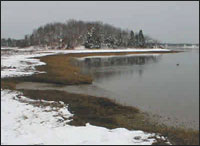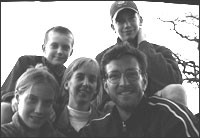Kurt Teichert is environmental coordinator at Brown University in Providence, R.I., where he develops initiatives with students, faculty, and administrators to reduce the negative environmental impacts of the university operations.
Monday, 21 Jan 2002
POCASSET, Mass.
My dog Auggie and I headed out before breakfast this morning for a sunrise walk in Mud Cove. Located at the end of an unmarked gravel road, past the underutilized railroad tracks that carry trash to the off-cape incinerator, this cove is classic Cape Cod. I am careful to walk Auggie deep into the woods in the adjacent Bourne Conservation Trust Land, as canine-originated nitrogenous effluent (aka dog poop) is a major cause of shellfish bed closures in this area. I will be home all day today and will not be making the trek into Providence, so I linger to enjoy reflections of yesterday’s snowfall on the calm water.

Mud Cove in Bourne.
Photo: Kurt Teichert.
It is Martin Luther King, Jr., Day and my thoughts are filled with what could have been: JFK, Bobby Kennedy, and Dr. King would now be wise elder statesmen had they lived full lives. I am buoyed by the realization that this holiday is still largely about a great person and a dream — not about shopping — and that many feel compelled to spend the day in service, rather than just taking “a day off.” The last time I remember going to work on this day was when I was at New Alchemy Institute, working under then-director Greg Watson, an African-American who is a true visionary in the environmental and energy fields in New England. We planted and dedicated a Peace Pole on the Institute’s farm in a ceremony that was very emotional for all of us.
It was during a six-month appointment at New Alchemy to research the economics of organic farming that I came to Cape Cod with Karen and our 5-month-old son, Derek, back in 1985. Those months turned into years at NAI, where 12-hour days on nonprofit pay were supplemented with bartending at night and carpentry on weekends. My work was dedicated to “sustainable living,” yet it seemed like our life was far from it. While raising our young children, Karen counseled emotionally disturbed foster kids who lived in our home. We were the archetypical young idealists who were way overextended and trying to do some good in the world before we hit total burnout. Hopefully during that time we advanced the ideals of our fallen leaders in some small way. We’re still here 17 years later, with kids in high school, ties to the community, and a 200-year-old home we’re currently remodeling.

Hilary, Kevin, Karen, Kurt, and Derek on safari in Tanzania.
Photo: Kurt Teichert.
Today’s service to the community will have to be limited to picking up some plastic jugs and beer cans around Mud Cove, as I have much work to do on the house and Karen and the kids are all home from school today. Last fall I took on the roles of architect, client, engineer, general contractor, and grunt in our home-remodeling effort; we’re putting on an addition that will have passive solar orientation, thermal and mechanical performance to Energy Star standards, and a salvaged active solar thermal hot water system coupled to a radiant slab floor. Much of the work will use salvaged materials so that the addition blends in with the character of the rest of the house and so that I can give the appearance of being a creative, environmentally responsible homeowner when entertaining guests and consuming stuff.
Today we are putting down a base of crushed stone so we can lay insulation and tubing for the radiant floor system. Kevin, our youngest, operates the rented flat-plate compactor (“my hands are numb, Dad”) to pack the substrate for a stable slab. It has been a rewarding (usually) experience to have total control over the project. Friends and neighbors have done much of the hired work and our family is investing plenty of sweat equity in the project (“What will we do next, Dad, if we’re ever done roofing?”). In my work on buildings at Brown, I often have to contend with the many reasons that something can’t be done, either due to an alleged lack of time and money, or an apparent shortage of common sense. On my own project, I can spend less time considering whether to call it green or sustainable and more time just getting it done with my own hands.

